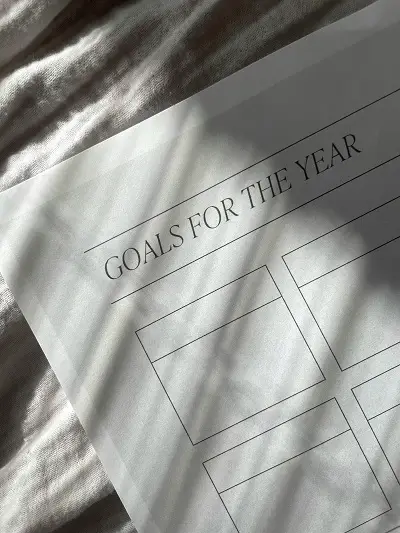Goal setting is not about following some strict rules or aiming for perfection.
It’s all about knowing what you want and break your goals into small steps to attain your main goal and staying flexible along the way!

We all set goals at some point or the other whether that may be for work, health or even personal growth.
But have you noticed, something about goal-setting doesn’t quite work for many of us? That’s mainly because we have been following certain myths about how goals work.
Let’s take a moment to talk about these myths and set goals that will work for you.
Here are the 8 common myths about goal setting that might be holding you back, along with some practical tips to overcome them and achieve your goals with ease & confidence.
Save Pin For Later

*This post contains affiliate links. Please read the full disclosure here.
Let’s begin…
Myth 1 – Need to Aim for Perfection
We often have this mentality that our goals need to be perfect. Everything has to go as we have exactly planned for.

But the reality is, life does not work that way, does it?
Things happen – good and bad. Instead of chasing perfection, we need to focus on our progress.
Every little step no matter how small counts!
Myth 2 – You Must Have A Strict Timeline
Setting a timeline to achieve your goals is a good thing, however, being too strict about it will add unnecessary pressure.

“I will achieve this in three months or else!”, does this sounds familiar.? This is why having a strict timeline refrains you from achieving your goals.
Goals take time, and sometimes we need to extend that timeline. That shift is important.
Be kind to yourself and try to adjust as needed.
Myth 3 – Big Goals Are the Only Goals Worth Setting
We all ” dream big” don’t we?
While setting big goals is great, they can however feel overwhelming.
Small goals are just as important as setting big goals. They are like tiny building blocks that lead to big achievements.
It’s always best to take one step at a time.
You might also like –
Reflect and Reset: 5 Questions to Set You Up for New Year Ahead
15 Daily Self-Care Ideas To Boost Your Well-Being
20 Simple Ways To Get Your Life Together
Manifestation – Unleash The Power Within
50 Gratitude Journal Prompts For Positive Lifestyle
10 ways to Practice Mindfulness in Your eveyday life
8 things you should do at the beginning of the year
Myth 4 – You Should Stick to the Plan No Matter What
Planning is important, but it doesn’t have to be inflexible.

Life can throw surprises at you and sticking to a strict plan might not always be the best choice.
Flexibility is the key here!
Being flexible is important while setting a goal. If something isn’t working, it’s okay to adjust and approach the situation in a different way.
The goal stays the same, however getting there might change.
Myth 5 – You Need Motivation Every Day
Motivation is great, but let’s face it, it’s not always there!
There will be days when you might not feel like working towards your goals, and that is perfectly fine.

What really matters is the “discipline”!
Keep showing up even when you are not in the mood.
It’s this consistency that will bring the results and lead to your goals.
P.S – How To Get Things Done When You Don’t Feel Like It
Myth 6 – Failure Means You’re Doing It Wrong
Okay, now here’s the hard truth!
Failure is a part of the process and it’s normal in this journey.
Everyone fails at some point or the other and that’s how we learn, grow and improvise.
If something doesn’t work as you have planned, remember, it’s not the end.
It’s simply a lesson, pick yourself up, make adjustments and keep moving forward.
Myth 7 – Your Goals Have to Be Big & Bold
Not every goal needs to be earth-shattering! right?
Sometimes, small, simple goals can make a huge difference in your life.
Small everyday goals like being consistent in working out, drinking more water, or even a simple goal like reading a book for a month is all that matter.
All these small and simple goals also count and are very much achievable to give you that satisfaction of achievement.
Myth 8 – Goal Setting Is Only for Certain People
There is this perception that goal setting is just for high achievers or for business people.
But let me assure you, this is not the case.
Setting goals is for everyone. Whether you are a student, homemaker, parent or retiree.
Whether your goal is big or small, if you want to achieve something, you can set a goal.
Goal setting is not relevant to your age or professional achievements.
In conclusion, goal setting is not about being perfect or following a strict plan. It’s all about finding what works for you and staying disciplined.
There will be setbacks along the way but you will have to keep moving forward.
No matter how small or big goals you want to achieve, make sure you stay flexible and keep learning. Your progress is what counts!
Here are some examples of – How You Can Set Goals That Work
Now that we have cleared up some of the myths of setting goals, let’s focus on how to set goals that actually work.
1. Be Specific
Clearly define your goals.

Know exactly what you want to achieve. If you want to save money, make sure you have the exact number in your mind.
Instead of saying, ” I want to save money” say ” I want to save $500 in three months”. This is specific and a clear goal.
2. Break it Down
Break your larger goals into small manageable steps.
For example, if you aim to walk 10,000 steps per day, instead of starting with 10,000 on the very first day, start by walking 5000 steps per day for a week and then slowly build as you go.
Breaking your goals down into small and manageable steps will help keep you stay consistent without feeling overwhelmed.
3. Stay Flexible
Keep your mind open by adjusting to your goals.
It’s all about adapting and not being rigid when it comes to taking the steps towards achieving your goals.
If some things are not working, make adjustments and keep moving forward.
4. Celebrate Small Wins

Remember, every small win is worth celebrating!
This is what is going to keep you motivated and reassure you that you are on the right path to making progress towards your goals.
5. Be Realistic
Make sure the goals you set are achievable with your current life situations.
Unrealistic goals often lead to frustration and demotivation.
Types Of Goals You Can Set :
Short – Term Goals – These are quick & achievable, like completing a project this week.
Long-Term Goals – These goals take time & patience, an example would be learning a new language or a course.
Flexible Goals – These goals are open-ended goals that allow room for a change, something like trying out a new hobby without strict outcomes.
Consistent Goals – These goals require a consistent effort to achieve them, an example would be to maintain a good workout routine regularly.
In the end, goal setting is about creating a path that works best for you.
Whether you aim at achieving a big goal or small goal, short-term goal or long-term, what matters most is your commitment to taking the needed steps.
Remember to be flexible and celebrate the small wins as you go along.
Goals are tools to help us grow, learn and achieve what truly matters to us.
Start small, dream big and keep moving forward!
I hope this post was helpful to you. As always, thank you for taking the time to read this post.
Eralivine helps you to get more productive, and take a step in self-improvement & personal development.
If that’s what you are looking out for, then let’s connect!
You may also check out my recipe blog rustictadka.com if interested.


